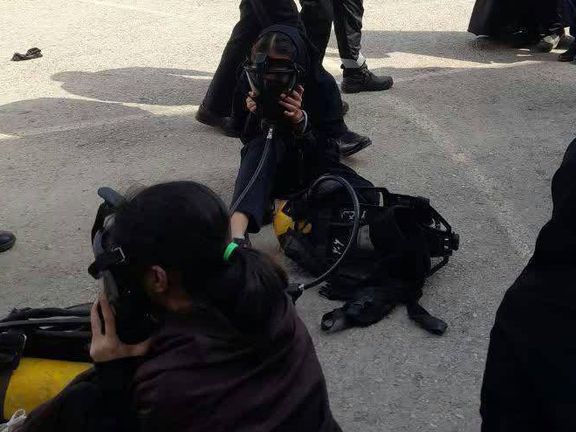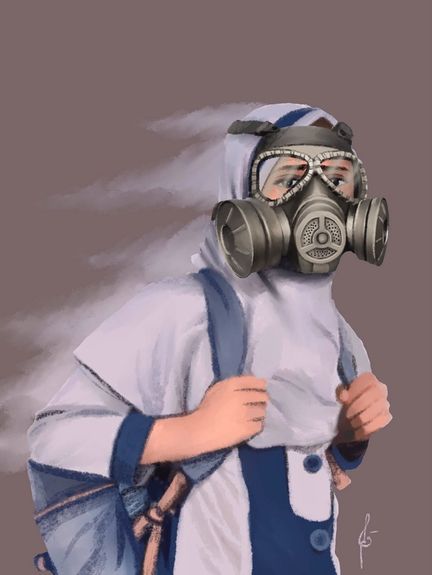Health Official Says ‘Irritant Substances’ Used In Iran School Attacks

A deputy health minister said Monday “irritant substances” were used in school gas attacks and claimed these had affected only “less than 10 percent” of students.

A deputy health minister said Monday “irritant substances” were used in school gas attacks and claimed these had affected only “less than 10 percent” of students.
“Our investigations indicate that probably less than 10 percent of the children [reportedly poisoned] had actually been affected by irritant substances,” the official in charge of the ministry’s treatment department, Dr. Saeed Karimi, told the semi-official Iranian Students News Agency (ISNA) Monday evening.
Attacks continued in at least 120 school in 25 of Iran's 31 provinces on Monday. The number of reported poisoning attacks across the country has greatly increased in the past few days.
Dr. Karimi said the ministry’s investigations were carried out by a committee of experts in pulmonology, toxicology, microbiology, infectious diseases, psychology, and environmental health who examined the poisoning reports from various provinces as well as some of the victims.
The “irritant substances,” he said, had affected the students between 10 to 15 minutes after they smelled fumes of varying odors and caused a burning sensation in the victims’ throats as well as coughing, shortness of breath, and tears followed by stomach cramps, lethargy, and in some cases, loss of limb movement.
Dr. Karimi, however, denied that what he called “irritant substances” were “dangerous, weapons grade, or deadly” but said they could have been thrown on a heat source such as a radiator in “solid, paste, powder or liquid form” before turning into fumes and spreading in the air.
“These irritant substances are not necessarily of one type to be named … They are generally readily available substances,” he said. “Irritant substances usually don’t bear long-term effects, [their effects are] passing, and are not used to cause permanent damage [to victims’ health],” he said.
However, some medical experts such as Dr. Mohammadreza Hashemian, an official at Masih Daneshvari Hospital in Tehran where many of the victims have been treated, have said that the gases suspected of being used seem to be composed of various chemicals that are not accessible to ordinary people.
The committee has obtained samples of these irritant substances but needs to recheck the results for certainty, the deputy health minister said. Meanwhile, social media reports indicate that private labs refuse to accept samples submitted by the public for the fear of getting into trouble with the authorities.

The deputy health minister also claimed that in around 90 percent of the cases symptoms were caused by stress and anxiety when other students fell ill or caused by media reports of the poisonings.
In the past 24 hours, there have also been reports of attacks on a boys’ high school in Karaj and boys’ primary in Esfahan and a shopping arcade in Ahvaz in southwestern Iran where at least 700 students were taken to hospital. Around ten shoppers who reportedly had some symptoms similar to the gas poisoning victims’ symptoms Sunday evening were also taken to hospital.
According to social media reports, some victims had nosebleeds as well but there are no further reports on the details of the incident.
The public is highly suspicious of the regime’s own involvement. A journalist was arrested in Qom Monday, apparently for investigating the possible connection of the perpetrators with hardliner groups loyal to the clerical regime. Sources in Iran say police and plainclothes agents present at the scenes of the attacks strictly prevent anyone from filming, presumably to prevent the perpetrators from being identified.
On Monday, for the first time since the first attack in the religious city of Qom on November 30, Supreme Leader Ali Khamenei addressed the issue. “If there are really hands at work, or individuals or groups that are involved in this, this will be a huge crime that cannot be overlooked,” he said, adding that culprits should be given maximum punishment for their crime.
Some social media users say they fear Khamenei’s condemnation of the attacks may result in falsely blaming opposition groups and punishment for innocent individuals to cover up the possible role of extremist religious groups who want to prevent girls from getting an education beyond elementary level.
Opposition groups inside Iran have called for nationwide protests on Tuesday and Wednesday.